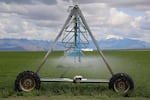Oregon water regulators are poised to change how they protect overdrawn aquifers.
The Oregon Water Resources Commission will consider a number of policy reforms at a two-day meeting this week in Harney County, a setting that’s become emblematic of state mismanagement of groundwater.
The proposed changes come after years of warnings about an impending crisis in the area, and as some local farms have expanded in response, including at least one Oregon brand purporting to be environmentally focused.
On Thursday afternoon, the commission plans to vote on updating rules for declaring critical groundwater areas. These rules lay out how regulators can rein in water rights when wells take much more than what nature restores. This type of state power hasn’t been deployed in more than 30 years, despite water table declines across the state.
The Oregon Department of Water Resources has said it first needs to update the rules to better align with state laws requiring it to stop excessive groundwater declines, and protect water users with more senior water rights.

A file photo of an irrigation pivot in Harney County on May 27, 2019. Spraying water at a lower height, so that less evaporates, is one conservation measure some farmers implemented in response to depleting groundwater levels.
Emily Cureton/OPB
The agency’s rulemaking process has gotten pushback from agricultural industry groups, and a coalition of Republican state lawmakers organized by state Rep. E. Werner Reschke, who represents parts of rural Deschutes and Klamath counties.
“This feels a bit slimy to me,” Reschke said to water managers at a May public hearing in Salem. “You’ve been sued before and it costs the state a lot of money because you didn’t listen to the people in the areas you were regulating.”
It’s been 32 years since Oregon declared a critical groundwater area. In places where the current rules were applied, groundwater declines have continued. In the state’s first such protected area, out-of-state investors now control all the water rights, as OPB reported last year in an investigation.
If the Water Resources Commission approves a new approach, the Harney Basin is likely to be the testing ground.
For decades, state regulators approved new water rights in the arid basin, with outflow going far beyond what gets replenished by rain and snow. Now, the county’s economy revolves around hay farms. Farmers have plunged deep wells to support this roughly $30 million-a-year industry. The pumping draws down the water table, drying up household wells, endangering ecosystems, and destroying aquifers that took thousands of years to accumulate.
“I’m not real hopeful,” said Laurie O’Connor, a Harney County property owner who planned to attend the commission meeting.
She doesn’t grow hay, and she’s spent thousands of dollars to keep her home’s well functioning.
“The rules might help in 20 or 30 years, but I don’t think it’s aggressive enough,” O’Connor said.
The water department stopped approving new water rights in the Harney Basin in 2016. But, this has not reduced how much groundwater is being used because it didn’t cut back existing permits.
Developers have continued to build new wells using prior approvals, drawing notable new investors to the basin.
In March, the state water department gave final authorization to more wells located near the Malheur National Wildlife Refuge, in an area where scientists have shown the water table shrinking by as much as 8 feet per year.
The owner of these particular wells, Chuck Eggert, is a well-known entrepreneur in the organic food industry from the Portland area. He sold his first company, Pacific Foods, for a reported $700 million in 2017.

A truck loaded with hay bales leaves Harney County, Ore., in December 2019.
Emily Cureton / OPB
In recent years, Eggert bought up 6,300 acres of alfalfa farms in Harney County. His footprint covers about 7% of the county’s total land with water rights.
In 2019, he launched Wild Rose Foods, which operates a collection of brands marketing sustainable, organic products from Oregon, including Aurora Valley Organic, Basics Market, Gwendolyn’s Organic Eggs, Lulubelle’s Creamery, Willamette Valley Cheese Co., and in Harney County, Silver Sage Farms.
The brands are “united by a commitment to simple, transparent ingredients, minimal (if any) processing, and deep care for the land, animals and community,” according to Wild Rose’s website.
Silver Sage Farms produces alfalfa hay for the companies’ livestock to eat.
In 2021, water regulators sent Eggert a notice of violation, accusing the farm of illegally taking groundwater without water rights, according to state records.
When Eggert succeeded in finalizing a different, legitimate water right this year, the certificate included some caveats. The company could face cutbacks if annual measurements reveal an average water-level decline of three or more feet per year, five years in a row.
Eggert and Wild Rose Foods could not be reached through requests for comment.
Even if the water commission votes to approve new rules for critical groundwater areas, more regulation specific to the Harney Basin is likely still years away.
The state water department does not “have a timeline at this point for reducing groundwater use in this area,” OWRD spokesperson Alyssa Rash wrote in a statement.
O’Connor, the resident worried about her home’s well, has already been engaged with the agency’s regulatory process for nearly seven years, and at this point, she’s feeling burned out.
“The average resident here is not being heard. This is harmful, and it’s going to be harmful for many, many decades. And it was for short-term opportunities for a few,” she said.
